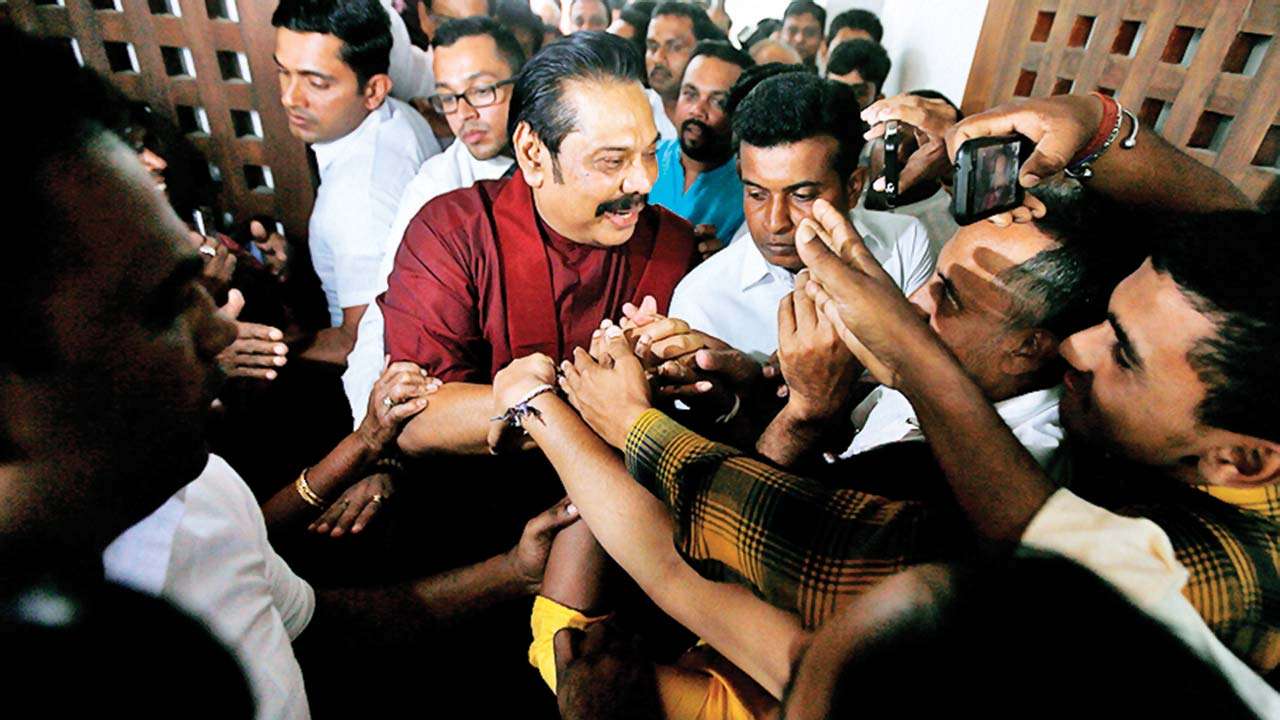
Dislodging the popular war victor Mahinda Rajapaksa from power in 2015 after riding a seven-year wave of triumphalism was as tough as defeating the once invincible LTTE. India, US and mainly the indigenous opposition orchestrated by former Sri Lankan president Chandrika Kumaratunga should be credited with the success of ‘Operation Topple’, an ingenious conjugation of Rajapaksa’s arch rivals. Rajapaksa, has blamed India for his downfall, which is overestimating New Delhi’s clout after it had been marginalised during the war. The main question however is his comeback, as he has targeted the government with a no-confidence motion today.
After three years out in the cold, a landslide victory in the local government polls has put the National Unity Government (NUG) of President Maithripala Sirisena of the Sri Lanka Freedom Party (SLFP) and Prime Minister Ranil Wickremesinghe of the United National Party (UNP) in a spot. Sri Lanka has already been rocked by ethnic violence between extremist Sinhala Buddhist extremists the Bodu Bala Sena (BBS) — who are reported to enjoy the patronage of the Rajapakasas — and Muslims in Amparai and Kandy. Local elections were postponed for two years in the hope the united government would have something to show.
Instead, the partners at the Centre decided to contest rather than cooperate at the polls resulting in a shock defeat at the hands of the Joint Opposition (JO) and Sri Lanka People’s Party. (SLPP). This is a timely wake up call. Clearly the two parties under their leaders were working at cross purposes, not in a power-sharing but competitive mode.
The elections were lost due to disillusionment with the unity government specifically over not delivering good governance, cosmetic action on corruption, lack of economic development, high cost of living and removal of subsidies that led to daily strikes and protests. The trigger to the combustible lapses was the government’s bonds scam which led to the UNP Finance Minister Ravi Karunanayake’s resignation. The bipartisan agreement between the two parties in the Unity government has been negated by Sirisena’s efforts at re-unifying his group and those in the JO led by Rajapaksa and his alleged back channel contact with him. In the two years left for this government, it will be deeds not words that will have to speak.
The hallmark of the Rajapaksa regime was authoritarianism, ultra-nationalism and nepotism and the government has finally decided to set up special courts to probe graft in his time in power. Investigations have been conducted against his brothers for fraud and two of his sons are being investigated for money-laundering. Rajapaksa’s influential secretary Lalith Weeratunga was awarded three years in jail for misappropriating US $4 million.
The government’s eight-year development plan 2025 has made tall promises: create one million new jobs, get US $5 bn FDI per year, double exports to US and raise per capita to US $5,000. On the national question of reconciliation – constitutional reforms and accountability, progress has been stymied by Rajapaksa, who promised to undo the institutions set up for reconciliation as well as no trial of war heroes. In other words, there would be no further devolution of powers for the Tamils.
In the Geneva resolution co-sponsored by the government in October 2015, the government had agreed to setting up four mechanisms – Truth Commission (TC), Office of Missing Persons (OMP), Office of Repatriation and Special Courts for Accountability. So far, only OMP has been legislated and members nominated for tracing out 20,000 missing persons. During the final stages of the war, according to one estimate, 40,000 civilians were killed while the names of two war heroes, serving Major Generals Jagath Jayasuriya and Shavendra de Silva are on the suspects’ list. Jayasuriya reportedly recently fled Brazil where he was ambassador as five countries in South America threatened to arrest him under the Rome Statute.
The Rajapaksas have rejected any trial of war heroes which ironically the government has also endorsed. The constitutional issues and the national question will regrettably return to the back burner until after the next elections.
Rajapaksa’s best bet is to try and break the Unity Government and hope for early elections before the people’s mood swings back in favour of his adversaries. The periodic ethnic violence perpetrated against Muslims by the BBS while discrediting the government could lead to a longer term radicalisation of Muslims and Islamic jihad. A rudimentary armed jihadist force had come up in the Eastern provinces during the time of the LTTE to protect mosques and the Muslims. Maldives next door has Al Qaeda and ISIS bases and Maldivians enjoy free passage for their nationals in Colombo. Two hundred Maldivians are known to have travelled to Iraq and Syria and two cases of ISIS were detected in Sri Lanka.
Should Rajapaksa return to power, it will be another victory for China who has already won over Nepal. With Hambantota Port with China for 99 years along with one pier in Colombo Port and the brand new China-built port city coming up next door, and Maldives slippping into China’s debt trap, it will be Beijing’s ‘necklace of pearls’ in India’s neighbourhood.
However, no Chinese submarine has docked in Sri Lankan waters since India’s mild rebuke in 2014.
The Unity government has two years to course-correct and to restore political order and stability in Colombo for much-needed economic development. As far as the JO sponsored no-confidence motion signed by 55 legislators to be discussed today is concerned, there is little chance that it can succeed. But it will certainly embarrass the Unity Government.
The author is former Commander of the IPKF (south) and a regular monitor of developments in Sri Lanka. Views are personal